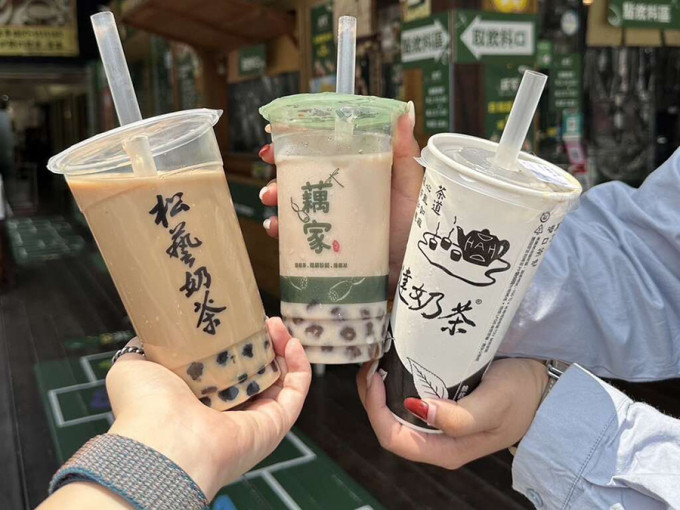Accidentally falling into the "small consumption" trap like buying milk tea every day can also leave many people's wallets empty.

Not long ago, a famous Chinese blogger shared a list of the number of times she bought milk tea in a year, 109 times and spent nearly 4,000 yuan (14 million VND). "The value of a cup of milk tea accumulated over time can empty your wallet without you even knowing it," the female blogger exclaimed.
She compared a cup of milk tea for 16 yuan to buy 8 chicken wings, nearly 1.5 ounces of pork belly, 8 packs of whole milk or 6 packs of wet towels. "I didn't expect that the money spent on a cup of milk tea could buy so many things in daily expenses," the blogger concluded. She also admitted that because of her passion for small consumption, she ignored the potential impact on her personal finances.
This is the “milk tea effect” – a seemingly harmless consumer behavior that has hidden economic risks. It’s not just about milk tea, but also how many people handle their small daily expenses.
Millionaire - co-founder of AE Wealth Management - David Bach (USA) once said that "small consumption" is controlled by an invisible force. Each time it is only a small amount, but it accumulates into a significant amount of money. The human brain also seems to be programmed to turn a blind eye to this small but frequent expense.
According to research by Indian-American economics professor Abhijit Banerjee, winner of the 2019 Nobel Prize in Economics, the reason why people remain poor is because they fall into the "small consumption trap". For example, buying dresses that they rarely use, or buying non-essential items when there is a sale because of the fear of missing out. Unreasonable consumption habits not only bring financial difficulties but also make many people sink into anxiety and panic.
"In reality, buying and selling only brings short-term joy, but the long-term consequences are a sense of urgency due to lack of money and self-blame for not being able to control yourself," the professor said.
From a psychological perspective, this concept of consumption gradually erodes people's understanding and pursuit of financial freedom, causing them to miss important opportunities to accumulate wealth. When they get used to spending small amounts of money regularly and unconsciously, they can also unintentionally neglect to improve their quality of life.
The famous financial book "The Millionaire Next Door" once reported that 80% of rich people are self-made. Most of them embarked on the path to financial freedom through hard work, savings, and self-discipline.
According to the book, the real mindset of the rich is to control their desire to consume. Constantly spending money means losing control of your life. "Only by holding on to money can you truly control your life," the book says.
Famous billionaire Pony Ma, Chairman of Tencent Holdings, China's Internet giant, once said: "A happy life will not fall from the sky. Only when you learn to save will you have capital to support your future."
According to Pony Ma, saving is about foresight and wisdom in planning for the future. To escape the "milk tea effect", it is important to raise awareness about personal finance and long-term planning. When each person is aware of and controls their spending behavior, they can lay a solid foundation for financial health and the future.
Think before you buy
In the book "Japanese Minimalist Lifestyle", author Fumio Sasaki gives a shopping standard, which is to answer three questions before buying anything: "Do I really need it?"; "Do I use it often?"; "Can this item be replaced?"
Thinking carefully about these questions can save you a lot of unnecessary expenses.
Buy better quality things
Think about this situation in life: I buy some clothes on sale at the mall, then realize that they "don't seem to suit me"; I get attracted by colorful advertisements, I buy a lot of cosmetics with similar effects but then have to throw them away because I can't use them all...
Instead of buying many products because of good advertising, you should consider buying the best product that meets all your needs.
Spend money wisely
Famous Hong Kong businessman Tan Kah Kee once said: "Spend tens of millions of dollars on things that are worth spending and save every penny on things that are not. Save money while you can by stopping spending on impulse."
Only by spending money where it can create new value can future growth be ensured.
Take the 1P challenge
The 1P Challenge is a year-long, 365-day money saving method. The challenge requires players to gradually increase the amount of money they save each day of the year.
For example, on the first day of 2024, the first day of the challenge, the player starts saving one coin. This number will increase to two coins on the second day, three coins on the third day, and so on, until on the last day of the year, the 365th day, the player needs to save 365 coins. In total, after one year (365 days), you will have saved 66,795 coins.
The formula for the 1P challenge is as follows: Amount saved in 365 days = Amount saved on the first day x 66,795.
During the 1P challenge, players can create a chart to mark their savings journey of "1 cent" each day. This makes it easy to check how much money they save each day, as well as see the results of financial management.
TB (according to VnExpress)